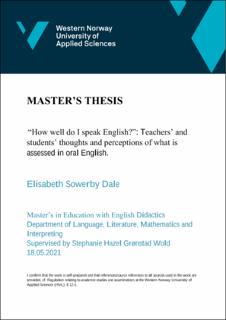| dc.description.abstract | This thesis explores oral English assessment in classroom settings and what is used as the basis for the final assessment grade through the perspectives of both teachers and students at the lower secondary level in Norway. Previous studies on the field of oral English assessment indicate that there is a lack of a common understanding of what to assess in oral English (Yildiz, 2011; Agasøster, 2015; Bøhn, 2016; Johannessen, 2018). Thus, the aim of the present study is to investigate what teachers focus on in the assessment of oral English in the classroom, and how these different elements are weighted in the assessment. In addition, this study investigates the students’ perceptions of what is assessed, to see if they are aware of what their own teacher assesses when it comes to oral English.
The overarching research question in this study is: What are teachers’ and students’ thoughts and perceptions on what is assessed in oral English in the classroom and for the final assessment grade? This research question, and three sub-research questions were created to investigate the issue of not fully understanding which aspects of oral performance are used to assess oral English. The data in this study were collected through semi-structured interviews with five teachers and an online questionnaire with their five 10th grade student groups.
The research findings in this study show that the teachers’ assessment practice mostly relate to the national guidelines of students’ performance for the final assessment after year 10 (The National Directorate for Education and Training, 2017). The findings also show that the teachers emphasise communication as the overall goal of the English subject and that they have some similar thoughts on what is important to assess in oral English. Nevertheless, the teachers do not have a common standard to use when they assess oral English in the classroom, and there are several differences in their assessment practices. The findings indicate that there are several similarities in what the teachers report as important to assess in oral English and what the students perceive is assessed. However, the findings also show that some have the perception that non-curricular criteria are assessed, such as effort and having a native-like accent. The comparison between the teachers’ and the students’ answers show that the students are not always aware of what is being assessed. The teachers have different thoughts on what the final oral assessment grade is based on, and many of the students do not have the same perception of what the final oral assessment grade is based on. The findings in this study complements several previous studies, and the information that is presented here can hopefully be used in further discussion on the field of oral English assessment. | en_US |

